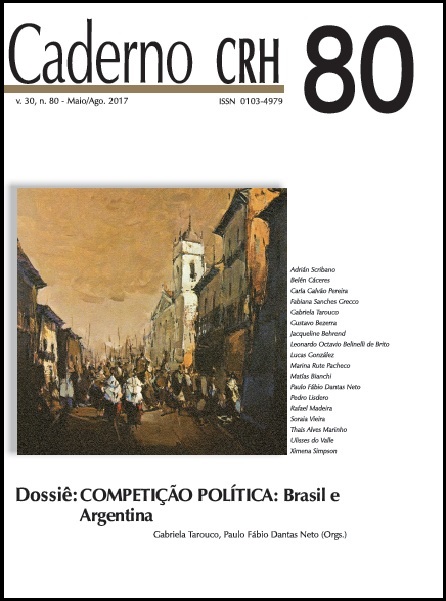TERRITORIALIDADE E CULTURA ENTRE OS KALUNGA: para além do culturalismo
DOI:
https://doi.org/10.9771/ccrh.v30i80.19841Palavras-chave:
Etnografia, Identidade, Territorialidade, Quilombolas, Cultura, ReconhecimentoResumo
Este artigo apresenta uma discussão sobre as ressignificações identitárias ocorridas na comunidade remanescente de quilombo denominada Kalunga, localizada no nordeste de Goiás, Brasil, ao longo de sua formação e a partir do reconhecimento dessas comunidades pela Constituição Federal Brasileira de 1988. O reconhecimento adiciona novas problemáticas identitárias que reverberam na forma como o grupo vivencia e organiza o território. Por meio de um estudo etnográfico, busco demonstrar que a etnicidade do grupo se sustenta em sua própria organização social e territorial, não sendo possível identificar um objeto de contornos limitados – cor, muito menos a “raça”, ou a cultura africana, ou a origem quilombola – com o qual os indivíduos se defrontem e a partir do qual inaugurem sua identidade.
TERRITORIALITY AND CULTURE AMONG THE KALUNGA: beyond the culturalism
This article presents a discussion about the identity resignifications that occurred in a remaining Quilombo community called Kalunga, located in northeast of the state of Goiás, Brazil, ranging from its formation and from the recognition of these communities by the Brazilian Federal Constitution of 1988. The recognition adds new identity problems that appear in the way in which the group experiences and organizes the territory. Considering an ethnographic study, I try to demonstrate that the ethnicity of the group is based on its own social and territorial organization, and that it is not possible to identify an object of limited contours – neither color, “race” or African culture, nor Quilombo origin – in which the individuals face each other and from which they inaugurate their identity.
Key words: Ethnography; Identity; Territoriality; Quilombolas; Culture; Recognition
TERRITORIALITÉ ET CULTURE ENTRE LES KALUNGA: pour aller au-delà du culturalisme
Cet article présente une discussion sur les réaffectations identitaires qui ont eu lieu dans la communauté rémanente de marronnage nommée Kalunga, située dans le nord-est de Goias, au Brésil, tout au long de sa formation et de la reconnaissance de ces communautés par la Constitution Fédérale Brésilienne de 1988. Cette reconnaissance ajoute de nouvelles problématiques identitaires qui se répercutent dans la manière qu’a ce groupe de vivre et de s’organiser sur le territoire. Sur la base d’une étude ethnographique, nous essayons de démontrer que l’ethnicité du groupe se maintient grâce à sa propre organisation sociale et territoriale sans qu’il soit possible d’identifier un objet aux contours limités – couleur, bien moins la “race “ ou la culture africaine, ou l’origine marronne- auquel les individus sont confrontés et à partir duquel ils inaugurent leur identité.
Key words: Ethnographie; Identité; Territorialité; Les Marrons; Culture; Reconnaissance
Downloads
Downloads
Publicado
Como Citar
Edição
Seção
Licença
Todo o conteúdo da revista, exceto onde indicado de outra forma, é licenciado sob uma atribuição do tipo Creative Commons BY.
O periódico Caderno CRH on-line é aberto e gratuito.





